江苏省普通高等学校2017年高三招生考试模拟测试英语试题(十二) 含解析
江苏省普通高等学校2017年高三招生考试模拟测试英语试题(九) 含解析
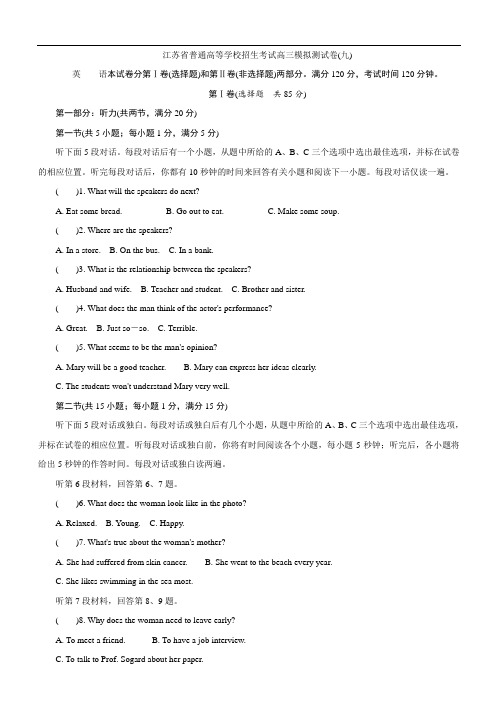
江苏省普通高等学校招生考试高三模拟测试卷(九)英语本试卷分第Ⅰ卷(选择题)和第Ⅱ卷(非选择题)两部分。
满分120分,考试时间120分钟。
第Ⅰ卷(选择题共85分)第一部分:听力(共两节,满分20分)第一节(共5小题;每小题1分,满分5分)听下面5段对话。
每段对话后有一个小题,从题中所给的A、B、C三个选项中选出最佳选项,并标在试卷的相应位置。
听完每段对话后,你都有10秒钟的时间来回答有关小题和阅读下一小题。
每段对话仅读一遍。
()1. What will the speakers do next?A. Eat some bread.B. Go out to eat.C. Make some soup.()2. Where are the speakers?A. In a store.B. On the bus.C. In a bank.()3. What is the relationship between the speakers?A. Husband and wife.B. Teacher and student.C. Brother and sister.()4. What does the man think of the actor's performance?A. Great.B. Just so-so.C. Terrible.()5. What seems to be the man's opinion?A. Mary will be a good teacher.B. Mary can express her ideas clearly.C. The students won't understand Mary very well.第二节(共15小题;每小题1分,满分15分)听下面5段对话或独白。
每段对话或独白后有几个小题,从题中所给的A、B、C三个选项中选出最佳选项,并标在试卷的相应位置。
2017年江苏省英语高考(试卷及答案)
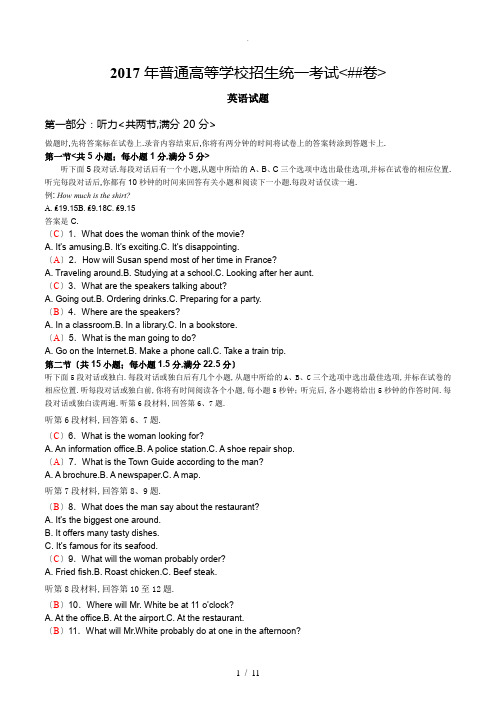
2017年普通高等学校招生统一考试<##卷>英语试题第一部分:听力<共两节,满分 20 分>做题时,先将答案标在试卷上.录音内容结束后,你将有两分钟的时间将试卷上的答案转涂到答题卡上.第一节<共5小题;每小题1分,满分5分>听下面5段对话.每段对话后有一个小题,从题中所给的A、B、C三个选项中选出最佳选项,并标在试卷的相应位置.听完每段对话后,你都有10秒钟的时间来回答有关小题和阅读下一小题.每段对话仅读一遍.例:How much is the shirt?A. ₤19.15B. ₤9.18C. ₤9.15答案是C.〔C〕1.What does the woman think of the movie?A. It’s amusing.B. It’s exciting.C. It’s disappointing.〔A〕2.How will Susan spend most of her time in France?A. Traveling around.B. Studying at a school.C. Looking after her aunt.〔C〕3.What are the speakers talking about?A. Going out.B. Ordering drinks.C. Preparing for a party.〔B〕4.Where are the speakers?A. In a classroom.B. In a library.C. In a bookstore.〔A〕5.What is the man going to do?A. Go on the Internet.B. Make a phone call.C. Take a train trip.第二节〔共15小题;每小题1.5分,满分22.5分〕听下面5段对话或独白.每段对话或独白后有几个小题,从题中所给的A、B、C三个选项中选出最佳选项,并标在试卷的相应位置.听每段对话或独白前,你将有时间阅读各个小题,每小题5秒钟;听完后,各小题将给出5秒钟的作答时间.每段对话或独白读两遍.听第6段材料,回答第6、7题.听第6段材料,回答第6、7题.〔C〕6.What is the woman looking for?A. An information office.B. A police station.C. A shoe repair shop.〔A〕7.What is the Town Guide according to the man?A. A brochure.B. A newspaper.C. A map.听第7段材料,回答第8、9题.〔B〕8.What does the man say about the restaurant?A. It’s the biggest one around.B. It offers many tasty dishes.C. It’s famous for its seafood.〔C〕9.What will the woman probably order?A. Fried fish.B. Roast chicken.C. Beef steak.听第8段材料,回答第10至12题.〔B〕10.Where will Mr. White be at 11 o’clock?A. At the office.B. At the airport.C. At the restaurant.〔B〕11.What will Mr.White probably do at one in the afternoon?A. Recelive a guest.B. Have a meeting.C. Read a report.〔C〕12.When will Miss Wilson see Mr.White?A. At lunch time.B. Late in the afternoon.C. The next morning.听第9段材料,回答第13至16题.〔A〕13.Why is Bill going to Germany?A. To work on a project.B. To study German.C. To start a new company.〔B〕14.What did the woman dislike about Germany?A. The weather.B. The food.C. The schools.〔A〕15.What does Bill hope to do about his family?A. Bring them to Germany.B. Leave them in England.C. Visit them in a few months.〔B〕16.What is the probable relationship between the speakers?A. Fellow-travelers.B. Colleagues.C. Classmates.听第10段材料,回答第17至20题.〔C〕17.When did it rain last time in Juárez?A. Three days ago.B. A month ago.C. A year ago.〔A〕18.What season is it now in Juárez?A. Spring.B. Summer.C. Autumn.〔C〕19.What are the elderly advised to do?A. Take a walk in the afternoon.B. Keep their homes cool.C. Drink plenty of water.〔A〕20.What is the speaker doing?A. Hosting a radio program.B. Conducting a seminar.C. Forecasting the weather.第二部分:英语知识运用 <共两节, 满分 35 分>第一节:单项填空<共15小题;每小题1分,满分15分>请阅读下面各题,从题中所给的A、B、C、D四个选项中,选出最佳选项,并在答题卡上将该项涂黑.例:It is generally considered unwise to give a child_____he or she wantsA.howeverB.whateverC.whicheverD.whenever答案是B.〔A〕21.Many Chinese brands, their reputations over centuries,are facing new challenges from the modern market.A. having developedB. being developedC. developedD. developing〔B〕22.not for the support of the teachers,the student could not overcome her difficulty.A. It wereB. Were itC. It wasD. Was it〔D〕23.Locatedthe Belt meets the Road,Jiangsu will contribute more to the Belt and Road construction.A. whyB. whenC. whichD. where〔C〕24.The publication of Great Expectations,whichboth widely reviewed and highly praised,strengthened Dickens,status as a leading novelist.A. isB. areC. wasD. were〔B〕25.Working with the medical team in Africa hasthe best in her as a doctor.A. held outB. brought outC. picked outD. given out〔C〕26.We choose this hotel because the price for a night here is down to $20,half ofit used to charge.A. thatB. whichC. whatD. how〔A〕27.He hurried home,never once looking back to see if he.A. was being followedB. was followingC. had been followedD. followed〔C〕28.In 1963 the UN set up the World Food Programme,one ofpurposes is to relieve worldwide starvation.A. whichB. itsC. whoseD. whom〔D〕29.Only five years after Steve Jobs’ death ,smart-phones defeatedPCs in sales.A. controversialB. contradictoryC. confidentialD. conventional〔A〕30.A quick review of successes and failures at the end of year will helpyour year ahead.A. shapeB. switchC. stretchD. sharpen〔C〕31.He’s been informed that hefor the scholarship because of his academic background.A. hasn’t qualifiedB. hadn’t qualifiedC. doesn’t qualifyD. wasn’t qualifying〔D〕32.Determining where we areour surroundings remains an essential skill for our survival.A. in contrast toB. in defense ofC. in face ofD. in relation to〔B〕33.—What does the stuff on your T-shirt mean?—It’s nothing. Just something.A. as clear as dayB. off the top of my headC. under my noseD. beyond my wildest dreams〔A〕34.The disappearance of dinosaurs is not necessarily caused by astronomical incidents. But explanations are hard to find.A. alternativeB. aggressiveC. ambiguousD. apparent〔B〕35.—Going to watch the Women’s Volleyball Match on Wednesday?—!Will you go with me?A. You thereB. You betC. You got meD. You know better第二节:完形填空<共20小题;每小题1分,满分20分>请阅读下面短文,从短文后各题所给的A、B、C、D四个选项中,选出最佳选项,并在答题卡上将该项涂黑.For a long time Gabriel didn’t want to be involved in music at all. In his first years of high school,Gabriel would look pityingly at music students, 36across the campus with their heavy instrument cases. 37at school for practice hours38anyone else had to be there.He swore to himself to39music,as he hated getting to school extra early.40, one day, in the music class that was41of his school’s standard curriculum, he was playing idly 〔随意地〕on the piano and found it42to pick out tunes.With a sinking feeling,he realized that he actually43doing it.He tried to hide his44pleasure from the music teacher,who had45over to listen.He might not have done this particularly well,46the teacher told Gabriel that he had a good 47and suggested that Gabriel go into the music store-room to see if any of the instruments there 48him.There he decided to give the cello〔大提琴〕a49.When he began practicing,he took it very50.But he quickly found that he loved playing this instrument,and was51to practicing it so that within a couple of months he was playing reasonably well.This52,of course,that he arrived at school early in the morning,53his heavy instrument case across the campus to the54looks of the non-musicians he had left55.〔D〕36.A. travellingB. marching C. pacing D. struggling〔D〕37.A. rising up B. coming up C. driving up D. turning up〔A〕38.A. beforeB. after C. until D. since〔C〕39.A. betrayB. accept C. avoid D. appreciate〔B〕40.A. ThereforeB. However C. Thus D. Moreover〔A〕41.A. part B. nature C. basis D. spirit〔D〕42.A. complicated B. safe C. confusing D. easy〔C〕43.A. missedB. disliked C. enjoyed D. denied〔B〕44.A. transparentB. obvious C. false D. similar〔D〕45.A. run B. jogged C. jumped D. wandered〔A〕46.A. because B. but C. though D. so〔A〕47.A. ear B. taste C. heart D. voice〔C〕48.A. occurred to B. took to C. appealed to D. held to〔B〕49.A. change B. chance C. mission D. function〔C〕50.A. seriouslyB. proudlyC. casuallyD. naturally〔A〕51.A. committed B. usedC. limitedD. admitted〔D〕52.A. proved B. showedC. stressedD. meant〔B〕53.A. pushingB. draggingC. liftingD. rushing〔B〕54.A. admiringB. pityingC. annoyingD. teasing〔C〕55.A. overB. asideC. behind D. out第三部分:阅读理解 <共 15 小题;每小题 2 分, 满分 30 分>请阅读下列短文,从短文后各题所给的A、B、C、D四个选项中,选出最佳选项,并在答题卡上将该项涂黑.ACHRONOLOGICA——The Unbelievable Years that Defined HistoryDID YOU KNOW…In 105 AD paper was invented in China?When Columbus discovered the New World?The British Museum opened in 1759?CHRONOLOGICA is a fascinating journey through time, from the foundation ofRome to the creation of the internet. Along the way are tales of kings andqueens, hot air balloons…and monkeys in space.Travel through 100 of the most unbelievable years in world history and learnwhy being a Roman Emperor wasn’t always as good as it sounds, how theHundred Years’ War didn’t actually last for 100 years and why Spencer Perceval holds a rather unfortunate record.CHRONOLOGICA is an informative and entertaining tour into history, beautifully illustrated and full of unbelievable facts. While CHRONOLOGICA tells the stories of famous people inhistory such as Thomas Edison and Alexander the Great, this book also gives anaccount of the lives of lesser-known individualsincluding the explorer Mungo Park and sculptor GutzonBorglum.This complete but brief historical collection is certain toentertain readers young and old, and guaranteed topresent even the biggest history lover with somethingnew!〔C〕56.What is CHRONOLOGICA according to the next?A. A biography.B. A travel guide.C. A history book.D. A science fiction.〔B〕57.How does the writer recommend CHRONOLOGICA to readers?A. By giving details of its collection.B. By introducing some of its contents.C. By telling stories at the beginning.D. By comparing it with other books.BBefore birth, babies can tell the difference betweenloudsounds and voices. They can even distinguish theirmother’svoice from that of a female stranger. But when it comestoembryonic learning <胎教>, birds could rule the roost.Asrecently reported in The Auk: Ornithological Advances,somemother birds may teach their young to sing even beforetheyhatch <孵化>. New-born chicks can then imitate theirmom’s callwithin a few days of entering the worl d.This educational method was first observed in 2012 bySoniaKleindorfer, a biologist at Flinders University in SouthAustralia, and her colleagues. Female Australian superb fairy wrens were found to repeat one soundover and over again while hatching their eggs. When the eggs were hatched, the baby birds madethe similar chirp to their mothers—a sound that served as their regular "feed me!〞call.To find out if the special quality was more widespread in birds, the researchers sought the red-backed fairy wren, another species of Australian songbird. First they collected sound data from 67nests in four sites in Queensland before and after hatching. Then they identified begging calls byanalyzing the order and number of notes. A computer analysis blindly compared calls produced bymothers and chicks, ranking them by similarity.It turns out that baby red-backed fairy wrens also emerge chirping like their moms. And themore frequently mothers had called to their eggs, the more similar were the babies’ begging calls. Inaddition, the team set up a separate experiment that suggested that the baby birds that most closelyimitated their mom’s voice were rewarded with the most foo d.This observation hints that effective embryonic learning could signal neurological <神经系统的> strengths of children to parents. An evolutionary inference can then be drawn. "As a parent, doyou invest in quality children, or do you invest in children that are in need?〞Kleindorfer asks. "Ourresults suggest that they might be going for quality.〞〔B〕58.The underlined phrase in Paragraph 1 means"〞.A. be the worstB. be the bestC. be the as badD. be just as good〔A〕59.What are Kleindorfer’s findings based on?A. Similarities between the calls of moms and chicks.B. The observation of fairy wrens across Australia.C. The data collected from Queensland’s locals.D. Controlled experiments on wrens and other birds.〔C〕60.Embryonic learning helps mother birds to identify the baby birds which.A. can receive quality signalsB. are in need of trainingC. fit the environment betterD. make the loudest callCA new commodity brings about a highly profitable,fast-growing industry,urging antitrust〔反垄断〕regulators to step in to check those who control its flow. A century ago,the resource in question was oil. Now similar concerns ares being raised by the giants〔巨头〕that deal in data, the oil of the digital age. The most valuable firms are Google,Amazon, Facebook and Microsoft. All look unstoppable.Such situations have led to calls for the tech giants to be broken up. But size alone is not a crime. The giants’success has benefited consumers. Fe w want to live without search engines or a quick delivery. Far from charging consumers high prices, many of these services are free <users pay, in effect, by handing over yet more data>. And the appearance of new-born giants suggests that newcomers can make waves, too.But there is cause for concern. The internet has made data abundant, all-present and far more valuable, changing the nature of data and competition. Google initially used the data collected from users to target advertising better. But recently it has discovered that data can be turned into new services: translation and visual recognition, to be sold to other companies. Internet companies’ control of data gives them enormous power. So they have a "God’s eye view〞of activities in their own markets and beyond. This nature of data makes the antitrust measures of the past less useful. Breaking up firms like Google into five small ones would not stop remaking themselves: in time, one of them would become great again.A rethink is required—and as a new approach starts to become apparent, two ideas stand out.The first is that antitrust authorities need to move form the industrial age into the 21st century. When considering a merger<兼并>,for example, they have traditionally used size to determine when to step in. They now need to take into account the extent of firms’data assets<资产> when assessing the impact of deals. The purchase price could also be a signal that an established company is buying a new-born threat. When this takes place, especially when a new-born company has no revenue to speak of, the regulators should raise red flags.The second principle is to loosen the control that providers of on-line services have over data and give more to those who supply them panies could be forced to consumers what information they hold and how many money they make form it. Govemments could order the sharing of certain kinds of data, with users’ consent.Restarting antitrust for the information age will not be easy But if govemments don’t wants a data oconomy by a few giants, they must act soon.〔A〕61.Why is there a call to break up giants?A. They have controlled the data marketB. They collect enormous private dataC. They no longer provide free servicesD. They dismissed some new-born giants〔C〕62.What does the technological innovation in Paragraph 3 indicate?A. Data giants’ technology is very expensiveB. Google’s idea is popular among data firmsC. Data can strengthen giants’ controlling positionD. Data can be turned into new services or products〔B〕63.By paying attention to firms’ data assets, antitrust regulators could.A. kill a new threatB. avoid the size trapC. favour bigger firmsD. charge higher prices〔D〕64.What is the purpose of loosening the giants’ control of data?A. Big companies could relieve data security pressure.B. Governments could relieve their financial pressure.C. Consumers could better protect their privacy.D. Small companies could get more opportunities.DOld Problem, New ApproachesWhile clean energy is increasingly used in our daily life, global warning will continue for some decades after CO2 emissions〔排放〕peak. So even if emissions were to begin to decrease today, we would still face the challenge of adapting to climate change. Here I will stress some smarter and more creative examples of climate adaptation.When it comes to adaptation, it is important to understand that climate change is a process. We are therefore not talking about adapting to a new standard, but to a constantly shifting set of conditions. This is why, in part at least, the US National Climate Assessment says that: "There is no ‘one-size fits all’adaptation.〞Nevertheless, there are some actions that offer much and carry little risk or cost.Around the world, people are adapting in surprising ways, especially in some poor countries. Floods have become more damaging in Bangladesh in recent decades. Mohammed Rezwan saw opportunity where others saw only disaster. His not-for-profit organization runs 100 river boats that serve as floating libraries, schools, and health clinics, and are equipped with solar panels and other communicating facilities. Rezwan is creating floating connectivity〔连体〕to replace flooded roads and highways. But he is also working at a far more fundamental level: his staff show people how to make floating gardens and fish ponds prevent starvation during the wet season.Elsewhere in Asia even more astonishing actions are being taken. Chewang Norphel lives in a mountainous region in India, where he is known as the Ice Man. The loss of glaciers<冰川> there due to global warming represents an enormous threat to agriculture. Without the glaciers, water will arrive in the rivers at times when it can damage crops. Norphel’s inspiration c ame from seeing the waste of water over winter, when it was not needed. He directed the wasted water into shallow basins where it froze, and was stored until the spring. His fields of ice supply perfectly timed irrigation<灌溉> water. Having created nine such ice reserves, Norphel calculates that he has stored about 200, 000m3 of water. Climate change is a continuing process, so Norp hel’s ice reserves will not last forever. Warming will overtake them. But he is providing a few years during which the farmers will, perhaps, be able to find other means of adapting. Increasing Earth’s reflectiveness can cool the planet. In southe rn Spain the sudden increase of greenhouses <which reflect light back to space> has changed the warming trend locally, and actually cooled the region. While Spain as a whole is heating up quickly, temperatures near the greenhouses have decreaseD. This example should act as an inspiration for all cities. By painting buildings white, cities may slow down the warming process.In Peru, local farmers around a mountain with a glacier that has already fallen victim to climate change have begun painting the entire mountain peak white in the hope that the added reflectiveness will restore the life-giving ice. The outcome is still far from clear. But the World Bank has included the project on its of "100 ideas to save the planet〞.More ordinary forms of adaptation are happening everywhere. A friend of mine owns an area of land in western Victoria. Over five generations the land has been too wet for cropping. But during the past decade declining rainfall has allowed him to plant highly profitable crops. Farmers in many countries are also adapting like this—either by growing new produce, or by growing the same things differently. This is common sense. But some suggestions for adapting are not. When the polluting industries argue that we’ve lost the battle to control carbon pollution and have no choice but to adapt, it’s a nonsense designed to make the case for business as usual.Human beings will continue to adapt to the changing climate in both ordinary and astonishing ways. But the most sensible form of adaptation is surely to adapt our energy systems to emit less carbon pollution. After all, if we adapt in that way, we may avoid the need to change in so many others.〔A〕65.The underlined part in Paragraph 2 implies .A. adaptation is an ever-changing processB. the cost of adaptation varies with timeC. global warming affects adaptation formsD. adaptation to climate change is challenging〔C〕66.What is special with regard to Rezwan’s project?A. The project receives government support.B. Different organizations work with each other.C. His organization makes the best of a bad situation.D. The project connects flooded roads and highways.〔A〕67.What did the Ice Man do to reduce the effect of global warming?A. Storing ice for future use.B. Protecting the glaciers from melting.C. Changing the irrigation time.D. Postponing the melting of the glaciers.〔D〕68.What do we learn from the Peru example?A. White paint is usually safe for buildings.B. The global warming tread cannot be stopped.C. This country is heating up too quickly.D. Sunlight reflection may relieve global warming.〔D〕69.According to the author, polluting industries should .A. adapt to carbon pollutionB. plant highly profitable cropsC. leave carbon emission aloneD. fight against carbon pollution〔B〕70.What’s the author’s preferred solu tion to global warming?A. Setting up a new standard.B. Reducing carbon emission.C. Adapting to climate change.D. Monitoring polluting industries.第四部分:任务型阅读 <共 10 小题;每小题 1 分, 满分 10 分>请阅读下面短文,并根据所读内容在文章后表格中的空格里填入一个最恰当的单词.注意:请将答案写在答题卡上相应题号的横线上.每个空格只填一个单词.Population ChangeWhy is the world’s population growing? The answer is not what you might think. The reasonfor the explosion is not that people have been reproducing like rabbits, but that people have stoppeddropping dead like flies. In 1900, people died at the average age of 30. By 2000 the average agewas 65. But while increasing health was a typical feature of the 20th century, declining birth ratecould be a defining one of the 21st.Statistics show that the average number of births per woman has fallen from 4.9 in the early1960s to 2.5 nowadays. Furthermore, around 50% of the world’s population live in regions wherethe figure is now below the replacement level <i.e. 2.1 births per woman> and almost all developednations are experiencing sub-replacement birth rate. You might think that developing nations wouldmake up the loss<especially since 80% of the world’s people now live in such nations>, but you’dbe wrong. Declining birth rate is a major problem in many developing regions too, which mightcause catastrophic global shortages of work force within a few decades.A great decline in young work force is likely to occur in China, for instance. What does itimply? First, China needs to undergo rapid economic development before a population decline hitsthe country. Second, if other factors such as technology remain constant, economic growth andmaterial expectations will fall well below recent standards and this could invite trouble.Russia is another country with population problems that could break its economic promise.Since 1992 the number of people dying has been bigger than that of those being born by a massive50%. Indeed official figures suggest the country has shrunk by 5% since 1993 and people in Russialive a shorter life now than those in 1961.Why is this occurring? Nobody is quite sure, but poordiet and above all long-time alcoholism have much to do with it. If current trends don’t bend,Russia’s population will be about the size of Yem en’s by the year 2050.In the north of India, the population is booming due to high birth rates, but in the south, wheremost economic development is taking place, birth rate is falling rapidly. In a further twist, birth rateis highest in poorly educated ru ral areas and lowest in highly educated urban areas. In total, 25% ofIndia’s working-age population has no education. In 2030, a sixth of the country’s potential workforce could be totally uneducated.One solution is obviously to import foreign workers via immigration. As for the USA, it isalmost unique among developed nations in having a population that is expected to grow by 20% from2010—2030. Moreover, the USA has a track record of successfully accepting immigrants. As a resultit’s likely to see a rise in the size of its working-age population and to witness strong economicgrowth over the longer term..earlier 77.living/life 78.equality 79.immigration 80.compensate第五部分:书面表达 <满分 25 分>81.请认真阅读下面有关我国电影票房收入〔box-office income〕的柱状图与相关文字,并按照要求用英语写一篇150词左右的文章.One Day in 2016. At Home.Son:Mum,shall we go and see a film tonight?Mother:Why bother?We can stay at home and watch films online.It’s convenient with our new and faster network Son:But it feels good in a cinema.Mother:And the price… We have to pay 50 yuan a ticket.Son:Only 10 yuan more than last year.Mother:But still we cannot get the money’s worth.Some films are just boring… [写作内容]1.用约30个单词概述柱状图...信息的主要内容; 2.我国电影票房收入变化的原因有哪些,简要谈谈你的看法〔上述对话仅供参考,原因不少于两点〕;3.谈谈你对我国电影票房收入走向的看法,并简要说明理由.[写作要求]1.写作过程中不能直接引用原文语句;2.作文中不能出现真实##和学校名称;3.不必写标题.[评分标准]内容完整,语言规X,语篇连贯,词数适当.[例文1]The box -office income of Chinese movies witnessed a constant increase from about 17 billionyuan in 2012 to over 40 billion in 2015.However, that increase slowed down in 2016.The reasons behind this are various. The fast economic development before 2016 was probablythe most powerful engine driving the constant growth in the box -office income. The application ofnew technologies and the wide appeal of movie stars could also account for the increase. However,China saw a decline in its economic growth rate last year. And the internet increased options formovie lovers. Consequently, some viewers began to turn away from cinemas, leading to a slowergrowth.Saturday Afternoon. In a Shopping Centre.Li Jiang: Hi, Su HuA. Which movie shall we see?Su Hua: Whatever. We ’ve got so many choices, Kung Fu Yoga , Journeyto the West …Each sounds great!Li Jiang: Yeah! And some movie stars are fantastic.Su Hua: And the high-tech!...Li Jiang: Perfect! Let ’s get some food first. We only have 20 minutes left.Su Hua: No hurry. The cinema is on the same floor..China’s economy is expected to grow at a medium speed in the coming years, so an increase ispossible in the investment in the movie industry and the number of quality movies. Therefore, itsbox-office income will probably enjoy a slight increase.<150 words>[例文2]As is indicated in the graph, the box-office income of Chinese films increased constantly from2012 to 2015, but its growth, for one reason or another, slowed down in 2016.The increase in the box-office income can be attributed to a number of factors. The quality oflife has improved and watching films is regarded as a good means of entertainment. Besides, filmingtechnology has advanced and more quality films are on offer. Moreover, the internet plays animportant part. On the internet, people can seek information about their favorite stars and buy ticketsat a discount as well, which is both time-saving and economical.However, the film market may witness a slowdown in the near future. Cinemas have graduallygiven way to the rise of the internet and cellphones, and the ticket price is on the increase.Therefore, the film industry should make greater efforts to attract more viewers.<150 words>11/ 11。
2017年高考真题(江苏卷)英语含解析
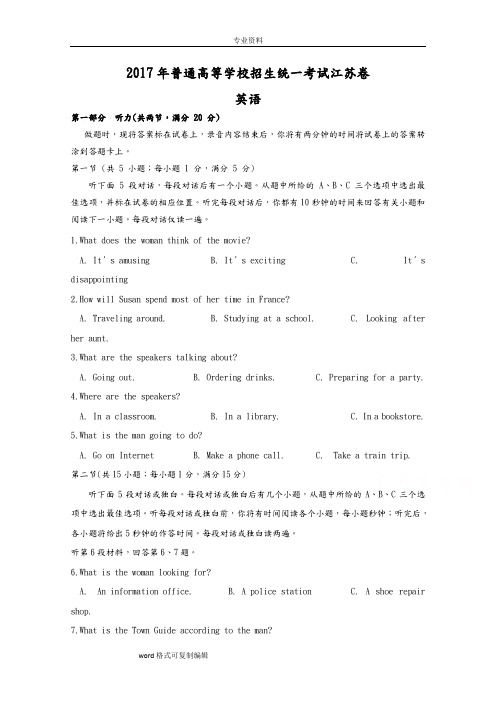
2017年普通高等学校招生统一考试江苏卷英语第一部分听力(共两节,满分 20 分)做题时,现将答案标在试卷上,录音内容结束后,你将有两分钟的时间将试卷上的答案转涂到答题卡上。
第一节 (共 5 小题;每小题 1 分,满分 5 分)听下面 5 段对话,每段对话后有一个小题。
从题中所给的 A、B、C 三个选项中选出最佳选项,并标在试卷的相应位置。
听完每段对话后,你都有10秒钟的时间来回答有关小题和阅读下一小题。
每段对话仅读一遍。
1.What does the woman think of the movie?A. It’s amusingB. It’s excitingC. It’s disappointing2.How will Susan spend most of her time in France?A. Traveling around.B. Studying at a school.C. Looking after her aunt.3.What are the speakers talking about?A. Going out.B. Ordering drinks.C. Preparing for a party.4.Where are the speakers?A. In a classroom.B. In a library.C. In a bookstore.5.What is the man going to do?A. Go on InternetB. Make a phone call.C. Take a train trip.第二节(共15小题;每小题1分,满分15分)听下面5段对话或独白。
每段对话或独白后有几个小题,从题中所给的A、B、C三个选项中选出最佳选项。
听每段对话或独白前,你将有时间阅读各个小题,每小题秒钟;听完后,各小题将给出5秒钟的作答时间。
每段对话或独白读两遍。
江苏省普通高等学校2017年高三招生考试模拟测试英语试题(十七) 含解析

江苏省普通高等学校招生考试高三模拟测试卷(十七)英语本试卷分第Ⅰ卷(选择题)和第Ⅱ卷(非选择题)两部分。
满分120分,考试时间120分钟。
第Ⅰ卷(选择题共85分)第一部分:听力(共两节,满分20分)第一节(共5小题;每小题1分,满分5分)听下面5段对话。
每段对话后有一个小题,从题中所给的A、B、C三个选项中选出最佳选项,并标在试卷的相应位置。
听完每段对话后,你都有10秒钟的时间来回答有关小题和阅读下一小题。
每段对话仅读一遍。
()1. Why will the man go to Beijing?A. To relax himself.B. To visit some friends.C. To attend meetings.()2. What's the relationship between the two speakers?A. Manager and secretary.B. Guest and host.C. Shop assistant and customer.()3. What do we know about the man?A. He slept well on the plane.B. He had a long trip.C. He had a meeting.()4. When will the trousers be ready?A. Thursday morning.B. Thursday afternoon.C. Friday afternoon.()5. How long will the man have to wait for the next bus?A. Four minutes.B. Six minutes.C. Ten minutes.第二节(共15小题;每小题1分,满分15分)听下面5段对话或独白。
每段对话或独白后有几个小题,从题中所给的A、B、C三个选项中选出最佳选项,并标在试卷的相应位置。
(精校版)2017年江苏英语高考真题文档版(含答案)
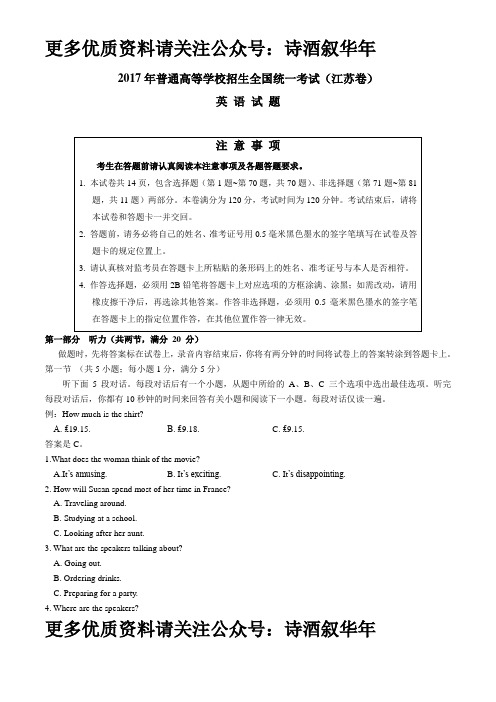
2017年普通高等学校招生全国统一考试(江苏卷)英语试题第一部分听力(共两节,满分20 分)做题时,先将答案标在试卷上,录音内容结束后,你将有两分钟的时间将试卷上的答案转涂到答题卡上。
第一节(共5小题;每小题1分,满分5分)听下面5段对话。
每段对话后有一个小题,从题中所给的A、B、C 三个选项中选出最佳选项。
听完每段对话后,你都有10秒钟的时间来回答有关小题和阅读下一小题。
每段对话仅读一遍。
例:How much is the shirt?A. ₤19.15.B. ₤9.18.C. ₤9.15.答案是C。
1.What does the woman think of the movie?A.It’s amusing.B. It’s exciting.C. It’s disappointing.2. How will Susan spend most of her time in France?A. Traveling around.B. Studying at a school.C. Looking after her aunt.3. What are the speakers talking about?A. Going out.B. Ordering drinks.C. Preparing for a party.4. Where are the speakers?更多优质资料请关注公众号:诗酒叙华年A. In a classroom.B. In a library.C. In a bookstore.5. What is the man going to do?A. Go on the Internet.B. Make a phone call.C. Take a train trip.第二节(共15小题;每小题1分,满分15分)听下面5段对话或独白。
每段对话或独白后有几个小题,从题中所给的A、B、C三个选项中选出最佳选项。
江苏省普通高等学校2017年高三招生考试模拟测试英语试题(十六) 含解析

江苏省普通高等学校招生考试高三模拟测试卷(十六)英语本试卷分第Ⅰ卷(选择题)和第Ⅱ卷(非选择题)两部分。
满分120分,考试时间120分钟。
第Ⅰ卷(选择题共85分)第一部分:听力(共两节,满分20分)第一节(共5小题;每小题1分,满分5分)听下面5段对话。
每段对话后有一个小题,从题中所给的A、B、C三个选项中选出最佳选项,并标在试卷的相应位置。
听完每段对话后,你都有10秒钟的时间来回答有关小题和阅读下一小题。
每段对话仅读一遍。
()1. How much should the man's rent be?A. $500.B. $125.C. $25.()2. What is the man's attitude towards his being late?A. He is ashamed.B. He gets angry.C. He doesn't care.()3. What's the man doing?A. He's travelling around.B. He's visiting a young couple.C. He's making a plan for a journey.()4. Where did the man put his camera?A. In his car.B. On the steps.C. Under his coat.()5. What does the woman mean?A. The cafeteria is too small.B. The cafeteria is short-handed.C. She isn't willing to wait that long.第二节(共15小题;每小题1分,满分15分)听下面5段对话或独白。
每段对话或独白后有几个小题,从题中所给的A、B、C三个选项中选出最佳选项,并标在试卷的相应位置。
2017年江苏省英语高考(试卷及答案)
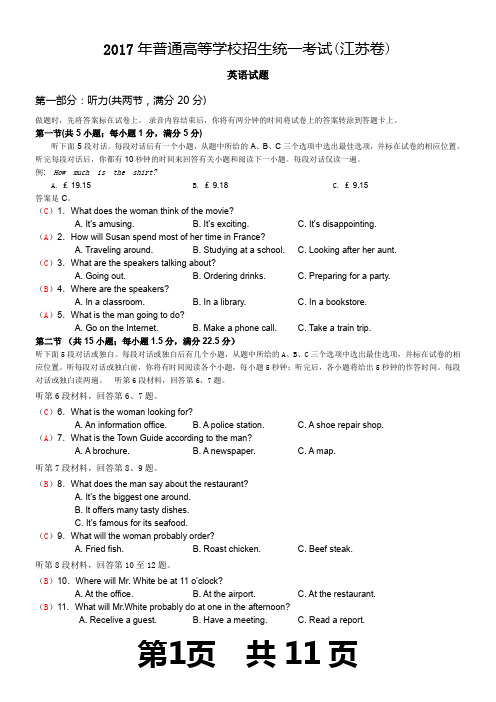
2017年普通高等学校招生统一考试(江苏卷)英语试题第一部分:听力(共两节,满分 20 分)做题时,先将答案标在试卷上。
录音内容结束后,你将有两分钟的时间将试卷上的答案转涂到答题卡上。
第一节(共5小题;每小题1分,满分5分)听下面5段对话。
每段对话后有一个小题,从题中所给的A、B、C三个选项中选出最佳选项,并标在试卷的相应位置。
听完每段对话后,你都有10秒钟的时间来回答有关小题和阅读下一小题。
每段对话仅读一遍。
例:How much is the shirt?A. ₤19.15B. ₤9.18C. ₤9.15答案是C。
(C)1.What does the woman think of the movie?A. It’s amusing.B. It’s exciting.C. It’s disappointing.(A)2.How will Susan spend most of her time in France?A. Traveling around.B. Studying at a school.C. Looking after her aunt.(C)3.What are the speakers talking about?A. Going out.B. Ordering drinks.C. Preparing for a party.(B)4.Where are the speakers?A. In a classroom.B. In a library.C. In a bookstore.(A)5.What is the man going to do?A. Go on the Internet.B. Make a phone call.C. Take a train trip.第二节(共15小题;每小题1.5分,满分22.5分)听下面5段对话或独白。
每段对话或独白后有几个小题,从题中所给的A、B、C三个选项中选出最佳选项,并标在试卷的相应位置。
(完整版)2017江苏高三英语高考模拟试卷
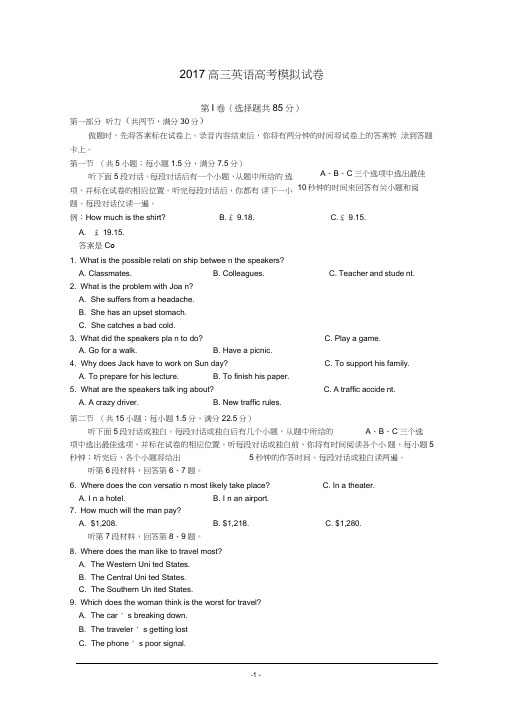
2017高三英语高考模拟试卷第I 卷(选择题共85分)第一部分 听力(共两节,满分30分)做题时,先将答案标在试卷上。
录音内容结束后,你将有两分钟的时间将试卷上的答案转 涂到答题卡上。
第一节 (共5小题;每小题1.5分,满分7.5分)听下面5段对话。
每段对话后有一个小题,从题中所给的 选项,并标在试卷的相应位置。
听完每段对话后,你都有 读下一小题。
每段对话仅读一遍。
例:How much is the shirt?A. £ 19.15.答案是C o1. What is the possible relati on ship betwee n the speakers?A. Classmates.B. Colleagues. 2. What is the problem with Joa n?A. She suffers from a headache.B. She has an upset stomach.C. She catches a bad cold.3. What did the speakers pla n to do?A. Go for a walk.B. Have a picnic. 4. Why does Jack have to work on Sun day? A. To prepare for his lecture.B. To finish his paper. 5. What are the speakers talk ing about? A. A crazy driver. B. New traffic rules. 第二节 (共15小题;每小题1.5分,满分22.5分)听下面5段对话或独白。
每段对话或独白后有几个小题,从题中所给的A 、B 、C 三个选 项中选出最佳选项,并标在试卷的相应位置。
听每段对话或独白前,你将有时间阅读各个小 题,每小题5秒钟;听完后,各个小题将给出5秒钟的作答时间。
江苏省普通高等学校2017年高三招生考试模拟测试英语试题(十一) 含解析
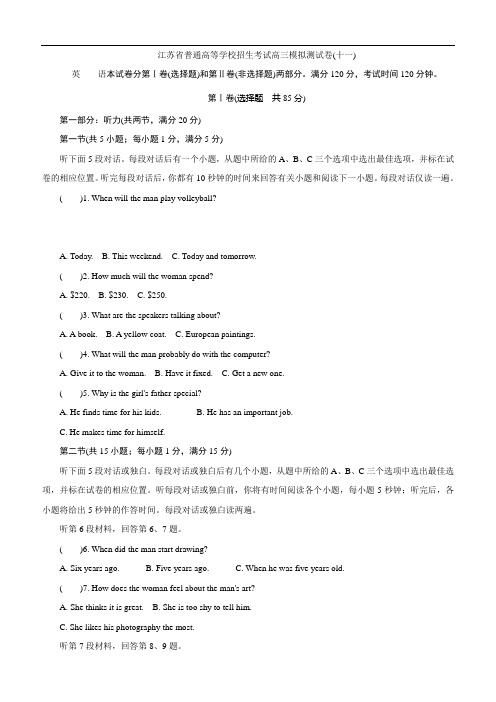
江苏省普通高等学校招生考试高三模拟测试卷(十一)英语本试卷分第Ⅰ卷(选择题)和第Ⅱ卷(非选择题)两部分。
满分120分,考试时间120分钟。
第Ⅰ卷(选择题共85分)第一部分:听力(共两节,满分20分)第一节(共5小题;每小题1分,满分5分)听下面5段对话。
每段对话后有一个小题,从题中所给的A、B、C三个选项中选出最佳选项,并标在试卷的相应位置。
听完每段对话后,你都有10秒钟的时间来回答有关小题和阅读下一小题。
每段对话仅读一遍。
()1. When will the man play volleyball?A. Today.B. This weekend.C. Today and tomorrow.()2. How much will the woman spend?A. $220.B. $230.C. $250.()3. What are the speakers talking about?A. A book.B. A yellow coat.C. European paintings.()4. What will the man probably do with the computer?A. Give it to the woman.B. Have it fixed.C. Get a new one.()5. Why is the girl's father special?A. He finds time for his kids.B. He has an important job.C. He makes time for himself.第二节(共15小题;每小题1分,满分15分)听下面5段对话或独白。
每段对话或独白后有几个小题,从题中所给的A、B、C三个选项中选出最佳选项,并标在试卷的相应位置。
听每段对话或独白前,你将有时间阅读各个小题,每小题5秒钟;听完后,各小题将给出5秒钟的作答时间。
江苏省普通高等学校2017年高三招生考试模拟测试英语试题(八) 含解析
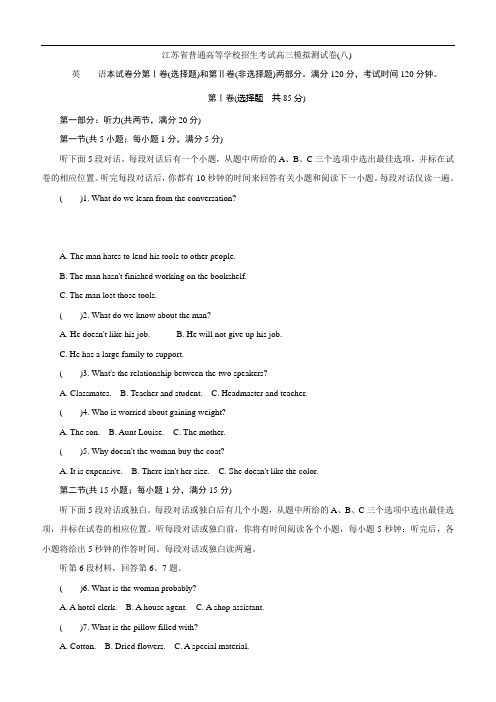
江苏省普通高等学校招生考试高三模拟测试卷(八)英语本试卷分第Ⅰ卷(选择题)和第Ⅱ卷(非选择题)两部分。
满分120分,考试时间120分钟。
第Ⅰ卷(选择题共85分)第一部分:听力(共两节,满分20分)第一节(共5小题;每小题1分,满分5分)听下面5段对话。
每段对话后有一个小题,从题中所给的A、B、C三个选项中选出最佳选项,并标在试卷的相应位置。
听完每段对话后,你都有10秒钟的时间来回答有关小题和阅读下一小题。
每段对话仅读一遍。
()1. What do we learn from the conversation?A. The man hates to lend his tools to other people.B. The man hasn't finished working on the bookshelf.C. The man lost those tools.()2. What do we know about the man?A. He doesn't like his job.B. He will not give up his job.C. He has a large family to support.()3. What's the relationship between the two speakers?A. Classmates.B. Teacher and student.C. Headmaster and teacher.()4. Who is worried about gaining weight?A. The son.B. Aunt Louise.C. The mother.()5. Why doesn't the woman buy the coat?A. It is expensive.B. There isn't her size.C. She doesn't like the color.第二节(共15小题;每小题1分,满分15分)听下面5段对话或独白。
江苏省普通高等学校2017年高三招生考试模拟测试英语试题(七) 含解析

江苏省普通高等学校招生考试高三模拟测试卷(七)英语本试卷分第Ⅰ卷(选择题)和第Ⅱ卷(非选择题)两部分。
满分120分,考试时间120分钟。
第Ⅰ卷(选择题共85分)第一部分:听力(共两节,满分20分)第一节(共5小题;每小题1分,满分5分)听下面5段对话。
每段对话后有一个小题,从题中所给的A、B、C三个选项中选出最佳选项,并标在试卷的相应位置。
听完每段对话后,你都有10秒钟的时间来回答有关小题和阅读下一小题。
每段对话仅读一遍。
()1.What has been fixed according to the woman?A.The dates.B.The schedule.C.Optional books.()2.How does the woman sound?A.Excited.B.Relaxed.C.Worried.()3.How many trips does the school organize on a weekday afternoon?A.2.B.3.C.5.()4.When does the man usually go off work?A.At4:30.B.At5o'clock.C.At8o'clock.()5.Where is the woman?A.In a soap factory.B.In her house.C.At an information desk.第二节(共15小题;每小题1分,满分15分)听下面5段对话或独白。
每段对话或独白后有几个小题,从题中所给的A、B、C三个选项中选出最佳选项,并标在试卷的相应位置。
听每段对话或独白前,你将有时间阅读各个小题,每小题5秒钟;听完后,各小题将给出5秒钟的作答时间。
每段对话或独白读两遍。
听第6段材料,回答第6、7题。
()6.What did the woman forget to do?A.To turn off the stove.B.To wash the pan after using it.C.To leave some breakfast for the man.()7.Who might Maria be?A.The man's girlfriend.B.The couple's neighbor.C.The woman's roommate.听第7段材料,回答第8至10题。
江苏省普通高等学校2017年高三招生考试模拟测试英语试题(十七) 含解析

江苏省普通高等学校招生考试高三模拟测试卷(十七)英语本试卷分第Ⅰ卷(选择题)和第Ⅱ卷(非选择题)两部分。
满分120分,考试时间120分钟。
第Ⅰ卷(选择题共85分)第一部分:听力(共两节,满分20分)第一节(共5小题;每小题1分,满分5分)听下面5段对话。
每段对话后有一个小题,从题中所给的A、B、C三个选项中选出最佳选项,并标在试卷的相应位置。
听完每段对话后,你都有10秒钟的时间来回答有关小题和阅读下一小题。
每段对话仅读一遍。
()1. Why will the man go to Beijing?A. To relax himself.B. To visit some friends.C. To attend meetings.()2. What's the relationship between the two speakers?A. Manager and secretary.B. Guest and host.C. Shop assistant and customer.()3. What do we know about the man?A. He slept well on the plane.B. He had a long trip.C. He had a meeting.()4. When will the trousers be ready?A. Thursday morning.B. Thursday afternoon.C. Friday afternoon.()5. How long will the man have to wait for the next bus?A. Four minutes.B. Six minutes.C. Ten minutes.第二节(共15小题;每小题1分,满分15分)听下面5段对话或独白。
每段对话或独白后有几个小题,从题中所给的A、B、C三个选项中选出最佳选项,并标在试卷的相应位置。
江苏省普通高等学校2017年高三招生考试模拟测试英语试题(八) 含解析

江苏省普通高等学校招生考试高三模拟测试卷(八)英语本试卷分第Ⅰ卷(选择题)和第Ⅱ卷(非选择题)两部分。
满分120分,考试时间120分钟。
第Ⅰ卷(选择题共85分)第一部分:听力(共两节,满分20分)第一节(共5小题;每小题1分,满分5分)听下面5段对话。
每段对话后有一个小题,从题中所给的A、B、C三个选项中选出最佳选项,并标在试卷的相应位置。
听完每段对话后,你都有10秒钟的时间来回答有关小题和阅读下一小题。
每段对话仅读一遍。
()1. What do we learn from the conversation?A. The man hates to lend his tools to other people.B. The man hasn't finished working on the bookshelf.C. The man lost those tools.()2. What do we know about the man?A. He doesn't like his job.B. He will not give up his job.C. He has a large family to support.()3. What's the relationship between the two speakers?A. Classmates.B. Teacher and student.C. Headmaster and teacher.()4. Who is worried about gaining weight?A. The son.B. Aunt Louise.C. The mother.()5. Why doesn't the woman buy the coat?A. It is expensive.B. There isn't her size.C. She doesn't like the color.第二节(共15小题;每小题1分,满分15分)听下面5段对话或独白。
江苏省普通高等学校2017年高三招生考试模拟测试英语试卷(六)

江苏省普通高等学校招生考试高三模拟测试卷(六)英语本试卷分第Ⅰ卷(选择题)和第Ⅱ卷(非选择题)两部分。
满分120分,考试时间120分钟。
第Ⅰ卷(选择题共85分)第一部分:听力(共两节,满分20分)第一节(共5小题;每小题1分,满分5分)听下面5段对话。
每段对话后有一个小题,从题中所给的A、B、C三个选项中选出最佳选项,并标在试卷的相应位置。
听完每段对话后,你都有10秒钟的时间来回答有关小题和阅读下一小题。
每段对话仅读一遍。
( )1. What does the woman mean?A. She prefers to put on more clothes.B. She wants to keep the windows open.C. She doesn't mind closing the windows.( )2. Why does the woman want to borrow the man's sound equipment?A. She can't afford to buy one.B. She wants to listen to some music.C. She wants to have a peaceful and quiet night.( )3. What does the man mean?A. He is highly paid.B. He likes his present job.C. His job is more important.( )4. What can we learn from the conversation?A. The new shirt doesn't fit the man.B. The man forgets to wear his new shirt.C. The man has no chance to wear his new shirt.( )5. What happened in the conversation?A. The phone didn't work.B. The woman stopped talking.C. The man suddenly fell to the ground.第二节(共15小题;每小题1分,满分15分)听下面5段对话或独白。
江苏省普通高等学校2017年高三招生考试模拟测试英语试题(二) 含解析
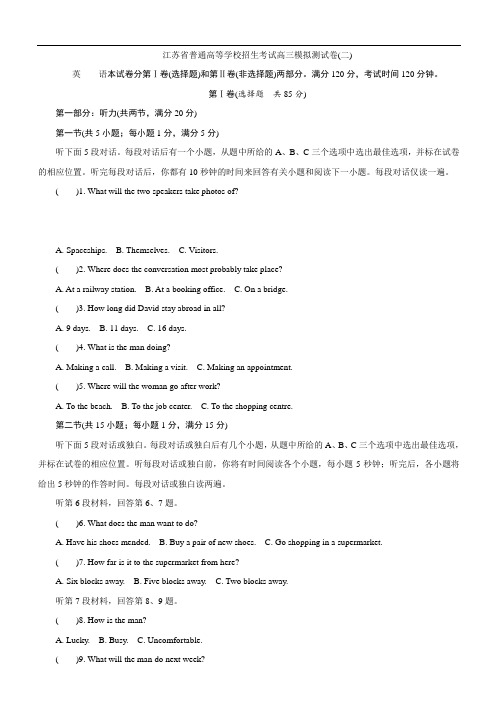
江苏省普通高等学校招生考试高三模拟测试卷(二)英语本试卷分第Ⅰ卷(选择题)和第Ⅱ卷(非选择题)两部分。
满分120分,考试时间120分钟。
第Ⅰ卷(选择题共85分)第一部分:听力(共两节,满分20分)第一节(共5小题;每小题1分,满分5分)听下面5段对话。
每段对话后有一个小题,从题中所给的A、B、C三个选项中选出最佳选项,并标在试卷的相应位置。
听完每段对话后,你都有10秒钟的时间来回答有关小题和阅读下一小题。
每段对话仅读一遍。
()1. What will the two speakers take photos of?A. Spaceships.B. Themselves.C. Visitors.()2. Where does the conversation most probably take place?A. At a railway station.B. At a booking office.C. On a bridge.()3. How long did David stay abroad in all?A. 9 days.B. 11 days.C. 16 days.()4. What is the man doing?A. Making a call.B. Making a visit.C. Making an appointment.()5. Where will the woman go after work?A. To the beach.B. To the job center.C. To the shopping centre.第二节(共15小题;每小题1分,满分15分)听下面5段对话或独白。
每段对话或独白后有几个小题,从题中所给的A、B、C三个选项中选出最佳选项,并标在试卷的相应位置。
听每段对话或独白前,你将有时间阅读各个小题,每小题5秒钟;听完后,各小题将给出5秒钟的作答时间。
江苏省普通高等学校2017年高三招生考试模拟测试英语试题(十九) 含解析

江苏省普通高等学校招生考试高三模拟测试卷(十九)英语本试卷分第Ⅰ卷(选择题)和第Ⅱ卷(非选择题)两部分。
满分120分,考试时间120分钟。
第Ⅰ卷(选择题共85分)第一部分:听力(共两节,满分20分)第一节(共5小题;每小题1分,满分5分)听下面5段对话。
每段对话后有一个小题,从题中所给的A、B、C三个选项中选出最佳选项,并标在试卷的相应位置。
听完每段对话后,你都有10秒钟的时间来回答有关小题和阅读下一小题。
每段对话仅读一遍。
()1.What's Mary's university life like?A.Exciting.B.Terrible.C.Ordinary.()2.What is the woman doing?A.Introducing a theater.B.Making invitations.C.Giving directions.()3.What's the probable relationship between the speakers?A.Teacher and student.B.Classmates.C.Colleagues.()4.What makes the man curious about David Beckham?A.Why people like him so much.B.What achievement he has made.C.How he performs so well.()5.Why will the man quit his job?A.He finds his work boring.B.He has got a better position.C.He doesn't get on well with the others.第二节(共15小题;每小题1分,满分15分)听下面5段对话或独白。
每段对话或独白后有几个小题,从题中所给的A、B、C三个选项中选出最佳选项,并标在试卷的相应位置。
江苏省普通高等学校2017年高三招生考试20套模拟测试英语试题(五) Word版含解析

江苏省普通高等学校招生考试高三模拟测试卷(五)英语本试卷分第Ⅰ卷(选择题)和第Ⅱ卷(非选择题)两部分。
满分120分,考试时间120分钟。
第Ⅰ卷(选择题共85分)第一部分:听力(共两节,满分20分)第一节(共5小题;每小题1分,满分5分)听下面5段对话。
每段对话后有一个小题,从题中所给的A、B、C三个选项中选出最佳选项,并标在试卷的相应位置。
听完每段对话后,你都有10秒钟的时间来回答有关小题和阅读下一小题。
每段对话仅读一遍。
()1. Where is the man's mother now?A. At home.B. In a hospital. D. At a bus stop.()2. Where does the conversation most probably take place?A. In a restaurant.B. In a clothing store.C. In a bookstore.()3. How does Susan probably look now?A. Pleased.B. Surprised.C. Upset.()4. What does the man's father want him to be?A. A musician.B. A doctor.C. A programmer.()5. What is the woman going to do?A. Go to see a movie.B. Meet her aunt at the station.C. Prepare a party.第二节(共15小题;每小题1分,满分15分)听下面5段对话或独白。
每段对话或独白后有几个小题,从题中所给的A、B、C三个选项中选出最佳选项,并标在试卷的相应位置。
听每段对话或独白前,你将有时间阅读各个小题,每小题5秒钟;听完后,各小题将给出5秒钟的作答时间。
江苏省普通高等学校2017年高三招生考试20套模拟测试英语试题(十九)含解析

江苏省普通高等学校招生考试高三模拟测试卷(十九)英语本试卷分第Ⅰ卷(选择题)和第Ⅱ卷(非选择题)两部分。
满分120分,考试时间120分钟。
第Ⅰ卷(选择题共85分)第一部分:听力(共两节,满分20分)第一节(共5小题;每小题1分,满分5分)听下面5段对话。
每段对话后有一个小题,从题中所给的A、B、C三个选项中选出最佳选项,并标在试卷的相应位置.听完每段对话后,你都有10秒钟的时间来回答有关小题和阅读下一小题.每段对话仅读一遍.( )1。
What's Mary’s university life like?A. Exciting. B。
Terrible. C。
Ordinary。
()2. What is the woman doing?A。
Introducing a theater。
B。
Making invitations. C。
Giving directions。
()3. What’s the probable relationship between the speakers?A。
Teacher and student. B。
Classmates. C. Colleagues。
( )4. What makes the man curious about David Beckham?A。
Why people like him so much。
B. What achievement he has made.C。
How he performs so well。
( )5。
Why will the man quit his job?A。
He finds his work boring。
B。
He has got a better position。
C. He doesn’t get on well with the others。
第二节(共15小题;每小题1分,满分15分)听下面5段对话或独白。
每段对话或独白后有几个小题,从题中所给的A、B、C三个选项中选出最佳选项,并标在试卷的相应位置。
- 1、下载文档前请自行甄别文档内容的完整性,平台不提供额外的编辑、内容补充、找答案等附加服务。
- 2、"仅部分预览"的文档,不可在线预览部分如存在完整性等问题,可反馈申请退款(可完整预览的文档不适用该条件!)。
- 3、如文档侵犯您的权益,请联系客服反馈,我们会尽快为您处理(人工客服工作时间:9:00-18:30)。
江苏省普通高等学校招生考试高三模拟测试卷(十二)
英语本试卷分第Ⅰ卷(选择题)和第Ⅱ卷(非选择题)两部分。
满分120分,考试时间120分钟。
第Ⅰ卷(选择题共85分)
第一部分:听力(共两节,满分20分)
第一节(共5小题;每小题1分,满分5分)
听下面5段对话。
每段对话后有一个小题,从题中所给的A、B、C三个选项中选出最佳选项,并标在试卷的相应位置。
听完每段对话后,你都有10秒钟的时间来回答有关小题和阅读下一小题。
每段对话仅读一遍。
()1. How will the woman go to the hotel?
A. By bus.
B. By taxi.
C. By plane.
()2. What does the woman think of McDonald's?
A. She hates the food.
B. It is too expensive.
C. It is too noisy.
()3. What does the woman ask the man to do?
A. Eat out.
B. Get her some food.
C. Make a call.
()4. What will the weather be like as forecasted?
A. It will be sunny.
B. It will be rainy.
C. It will be cold.
()5. Why does the woman think her apartment is beautiful?
A. She can see the park.
B. Her apartment is big and great.
C. There is a parking area.
第二节(共15小题;每小题1分,满分15分)
听下面5段对话或独白。
每段对话或独白后有几个小题,从题中所给的A、B、C三个项中选出最佳选项,并标在试卷的相应位置。
听每段对话或独白前,你将有时间阅读各个小题,每小题5秒钟;听完后,各小题给出5秒钟的作答时间。
每段对话或独白读两遍。
听第6段材料,回答第6、7题。
()6. Who put the key in the kitchen?
A. The man's mother.
B. The woman.
C. Harry.
()7. Where does the man need to go?
A. To a supermarket.
B. To his office.
C. To his home.
听第7段材料,回答第8、9题。
()8. What kind of person is Stan?
A. He's always ready to help others.
B. He never makes a special effort to help others.
C. He's unwilling to do extra work.。
